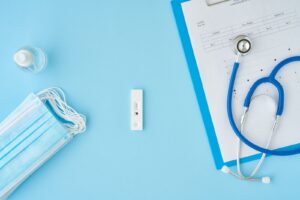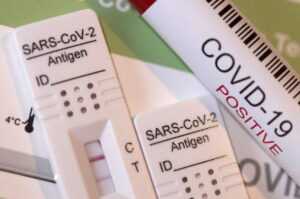
Pediatric Covid instances are springing up all across Alabama now that school has resumed and many of the students are not yet able to get their vaccinations. Furthermore, although children have been less impacted by COVID-19 than adults, they may and do get infected with the virus that causes COVID-19, with some having serious sickness and long-lasting consequences. Many youngsters in the Huntsville region are being exposed at school, which is leading to an increase in the need for pediatric Covid rapid antigen tests across North Alabama and the Southeast.
Urgent Care for Children offers two sites in the area – one on Carl T. Jones Drive in Huntsville and another on Highway 72 in Madison – to serve the needs of the community. The following choices will be available to parents that need a COVID rapid antigen tests for their children in a short amount of time:
- Antigen testing (results in 15-45 minutes)
- PCR rapid antigen tests (results in 3-5 days)
- Antibody rapid antigen tests (results in 3-5 days) (results in 15-45 minutes)
Children’s Children Require Immediate Attention Covid Rapid antigen tests Suggestions
Children who have had their blood tested have expressed a great deal of fear and anxiety, and the subject of testing has been in the news nonstop for more than a year. Children may have heard horror tales about having their “brain swabbed,” or they may be concerned about the procedure being uncomfortable.
The following is an interview with Erin Percy, CRNP and Clinical Director of Urgent Care for Children in Madison, Wisconsin, regarding how parents may assist their children in the event that they need a COVID-19 examination.
Providing assistance to children during the COVID-19 examination
Brain Swabbing as opposed to Gentle Swabbing
When Covid was first established, being tested was often referred to as “brain swabbing” due to the fact that the swab reached so deep into the nasal cavity. Urgent Care for Children, on the other hand, employs a gentle swabbing technique. learn more about brain swabbing by clicking here
“We gently swab the base of the nose, generally using two swabs each rapid antigen tests,” says the doctor. Children who have come to Urgent Care for Children for Covid rapid antigen tests are often amazed by how simple and painless the procedure is. “Most youngsters say it doesn’t hurt – they describe it as a tickling sensation – and that it doesn’t last more than a few seconds.”
Whenever rapid antigen tests come back negative, we suggest sending the sample out for a PCR test just to be sure. If you do not have symptoms or if you have been exposed for more than five days, a PCR rapid antigen tests is the best option.” Percy also claims that the Delta strain of Covid-19 presents as asymptomatic only in rare instances. learn more about PCR test at https://my.clevelandclinic.org/health/diagnostics/21462-covid-19-and-pcr-testing
In order to assist children to overcome their fear of the unknown, they must be well prepared before they have a Covid examination. The following was some excellent advice from Percy Jackson for parents and caregivers dealing with their child’s fears:
- Inform your kid ahead of time that they will be tested; do not keep them in the dark about this.
- Before you travel, practice using a Q-tip at home first. They’re even bigger than the actual swabs themselves!
- Maintain confidence in your students by assuring them that the exam itself will just take a few seconds.
- We’re not beyond bribing — Urgent Care for Children offers popsicles, lollipops, juice, stickers, and anything else it takes to convince your child to come in for their rapid antigen tests.
If you have a baby who has been exposed and is showing signs of illness, the rapid antigen tests procedure is the same as described above. “So far, our youngest Covid rapid antigen tests subject was 6 weeks old,” Percy said of the company’s youngest patient.
Making an appointment for a Covid rapid antigen tests at Urgent Care for Children
You should schedule a Covid rapid antigen tests appointment as soon as you are aware of a Covid exposure at your kid’s school or as soon as your child begins to show signs of Covid exposure. Make an appointment for Urgent Care for Children in Huntsville or Madison HERE, and learn more about the procedure in the process section of the website. Parents should be aware that most Urgent Care lobbies are closed, and patients will be required to wait in their vehicles. Wait times have been quite long at all rapid antigen tests sites in North Alabama recently, so it’s best to arrive early and be prepared.
In order to ensure that their vehicles have enough petrol, I’m advising families to have a fully charged phone. Bring something to pass the time while you’re waiting in your vehicle. And, unless you are experiencing really significant symptoms, do not go to the emergency room for a test. Children with mild to moderate symptoms or those who are not in respiratory distress are not being tested in the Emergency Rooms of local hospitals.” In other words, don’t go to the ER unless you believe you or your kid should be admitted to the hospital immediately.

Urgent Care for Children is thrilled to be the nation’s first sensory inclusive pediatric urgent treatment clinic, providing care to children with autism or sensory processing disorders. The sensory accommodations available at all Urgent Care for Children locations are designed to help patients who react better to a calmer, more secure setting. The physicians, nurse practitioners, and other medical professionals on the Urgent Care for Children team have received special training on how to react to pediatric patients who have sensory issues and how to alter their treatment strategy to meet those needs.
My child was subjected to a Covid rapid antigen tests. What Happens Next?
Many families are anxious about returning to their normal activities or visiting family members after their children have been tested for infectious diseases. Percy claims that the majority of people are unsure of what to do next.
“We suggest a 10- to 14-day period of isolation starting with the development of symptoms or a positive test.” After that, the majority of normally healthy children may return to school, participate in extracurricular activities, or visit relatives. Remember that kids cannot “test out” of quarantine from school — the 14-day quarantine is necessary for most local school systems, even if a negative test results in the case of a flu infection. Even if you have recovered from your symptoms, you may still test positive for Covid up to 90 days after receiving it.”


